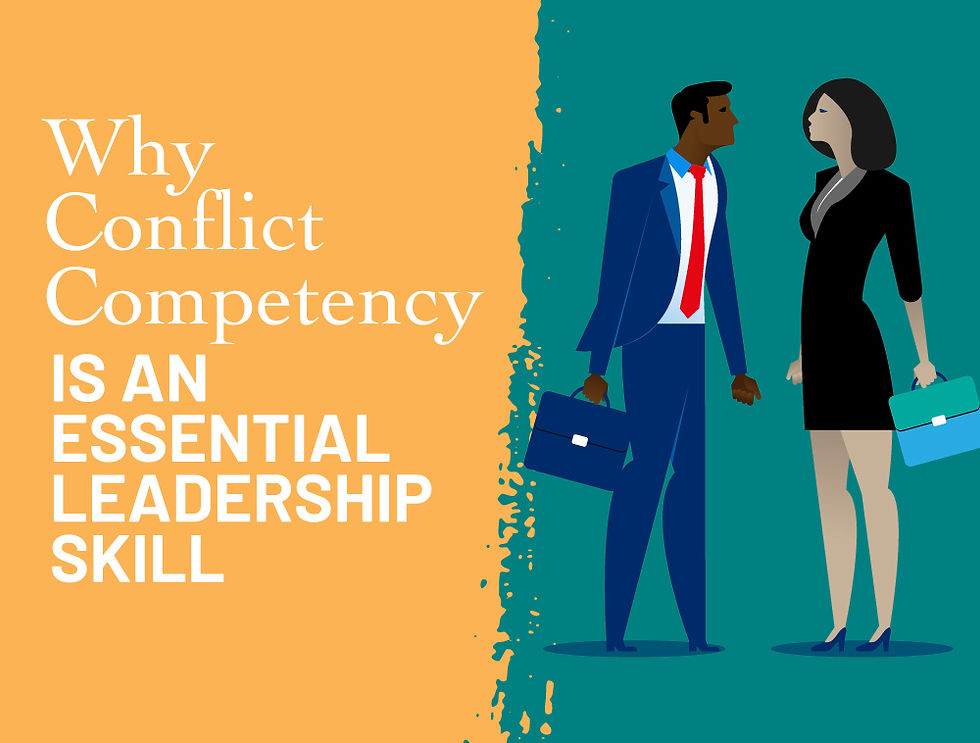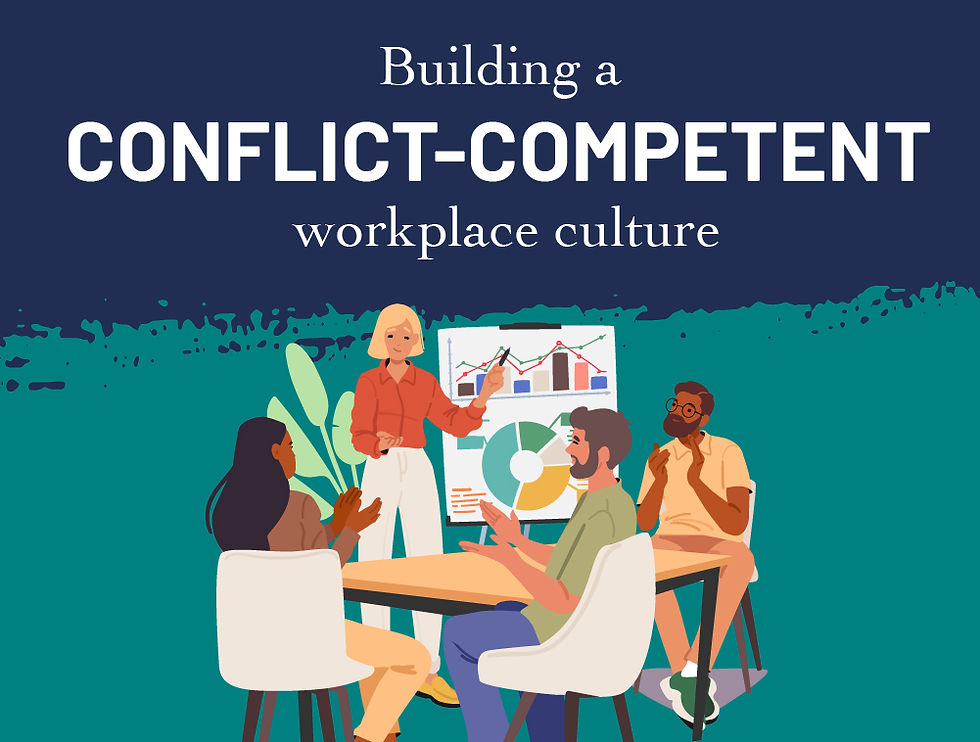Why Conflict Competency Is an Essential Leadership Skill
- Dionne Davis

- Apr 14, 2023
- 5 min read
Updated: Sep 10, 2025

Listen: Create a conflict competent workplace with Dr. Robyn Short on the Mission First, People Always podcast
Whether we lead teams in the workplace, projects in the communities, or congregations in our places of worship, wherever there is a need to mobilize people toward a shared goal or outcome, the primary purpose of the leader is to create an environment where every person can bring their best selves forward and that ensures our reason for being together is successful. For the leader, this requires significant proficiency in human behavior, which is why leaders should prioritize growing their skills and competencies in four essential leadership intelligences. As business leaders, we must embrace humanity in the workplace that allows for everyone to care about and thus deliver excellence in services and/or products to clients and customers.
The primary purpose of the leader is to create an environment where every person can bring their best selves forward and that ensures our reason for being together is successful.
Employees, particularly millennials and Gen Zs who make up 46% of the workforce, will remind us that personal and professional “wellbeing” is most important to them now more than ever. In the last two decades, Americans have lived through devastating and life-changing events — 9/11 terrorists attack, two wars (Iraq and Afghanistan) and recently a two-year shutdown due to the COVID19 pandemic. Millennials are “the most racially and ethnically diverse adult generation in the nation’s history. Yet the next generation — Generation Z — is even more diverse,” writes Michael Dimock, President of Pew Research Center.
Cross-Generational Conflict Competency
Cross-generational conflicts are real, in large part because each generation has experienced work as a means to different ends. Traditionalists and Baby Boomers worked to ensure basis survival. These generations prioritized actualizing safety and security through work. With survival needs in place, Gen X sought to achieve a higher standard of living. Work served as a means to actualize the American expectation that each generation will have more and do more than the generation before them. Therefore, GenX sought primarily to achieve the basic human needs of participation, self-esteem, and personal fulfillment through work. With a more advanced standard of living in place, millennials (GenY) saw work as an opportunity to improve their quality of life. This generation primarily seeks to ensure their basic human needs for inclusion, understanding, independence, acknowledgment, recognition, and fairness are achieved in the workplace. GenZ has emerged as a generation that is deeply committed to living a fully actualized life. This generation expects to have all basic human needs and dignity needs met in the workplace with an unwillingness to compromise one need for another. With so many generations in the workplace at one time, and each generation holding a different expectation around the purpose of work and the basic human needs they expect to have met in the workplace, multigenerational conflict is inevitable.

Conflict Happens Wherever Humans Gather
Conflict is inherent to the human condition. Our work environments will never be absent of human errors, mistakes, and disagreements that interrupt the follow of work; however, leaders can invest in the skills development to resolve conflict while also capturing great ideas and innovations at the intersection.
Workplace conflict can be understood as any extended struggle; clashing of ideas, ideologies, desires, needs, and ego; or incompatibility of drives, hopes, wishes, and demands that interrupt the flow or production of work. The question shouldn’t be how can we avoid workplace conflict, but rather how can we learn to navigate it with peace and dignity?
“Today, there is so much adversity in the world. We carry the stressors of the external world with us into our professional worlds. Just walk into a breakroom and listen to the conversations, and it will become abundantly clear that our leadership acumen matters. Perhaps more than many of us realize,” shares Robyn Short, CEO of Workplace Peace Institute.
Cultivating Conflict Competence
To become conflict competent leaders, we need to understand what creates conflict in the workplace. There are several reasons for conflict in the workplace, but they can all generally be understood as low competency in navigating the complexity of human behavior:
Poor management/leadership, particularly with working with diverse and cross generational workforces
Poor communication at every level within the organization
Unclear role and responsibility descriptions and expectations
Difference in approaches to a task and/or project
Cultivation of work competition versus cooperation/collaboration
Resistance and mismanagement of change
Toxic work environment due to mistrust and low morale, resulting from all the above
Avoiding conflict is a common practice in many organizations until it becomes insurmountable, and the next action becomes reactive. Lack of trust and respect diminishes a leader’s ability to lead for the good of the people and organization. As humans, we can think, learn, and communicate to mitigate or eliminate conflict in our organization. That is worth repeating: We can learn, but we must be open and willing to consider another way.
There are five leadership strategies to resolve conflict in the workplace:
Cultivate social, emotional, cultural, and dignity intelligences
Cultivate mindfulness as a core leadership competency
Center basic human needs in our leadership approach
Normalize conflict resolution education and training
Implement a human-centered mechanism to resolve conflicts
“Conflict competent leaders have proficiency in conflict dynamics, they understand the neuroscience of conflict and can leverage this understanding to optimize collaboration in the workplace, and they are able to navigate tough conversations with confidence and purpose,” writes Dr. Short. In addition, “managers can train staff on how to address issues appropriately when they arise, listen genuinely to their colleagues, discuss rather than debate their points, avoid blaming and basing thoughts on biases, and treat everyone fairly.”
If you ignore conflict, believe issues will resolve themselves, or even worse, are unaware of them entirely, the impact may be devastating to your employees’ relationships, preventing fresh ideas and innovations to surface in your organization. When we manage conflict, we enrich lives and relationships.
In The Medici Effect, Frans Johansson explains, “it is important to depersonalize conflicts. People should be able to disagree with anyone in the group — but not without reason. It is important to maintain an open environment where all ideas get a fair hearing.”
Without solid skills in conflict resolution, leaders overlook growth opportunities and the company’s ability to differentiate its people, product and/or services from its competitors. Conflict competency is essential and possible.
Workplace Peace Institute is an organization systems design and research firm that is singularly focused on creating workplace cultures where people thrive. Workplace Peace Institute supports small to mid-sized businesses in optimizing employee engagement, maximizing organizational productivity, and improving profitability by infusing human security and dignity as foundational attributes of their business model. Our Leadership Academy supports leaders in honoring basic human needs and dignity needs in the workplace, so they can actualize human potential in the workplace. The online Leadership Academy optimizes competencies in human behavior, communication skills, conflict resolution, and Diversity, Equity, Inclusion and Belonging to create highly engaged workplaces where basic human needs and dignity are consistently honored. All our courses are offered online and can be customized for in-person workshops and seminars.



